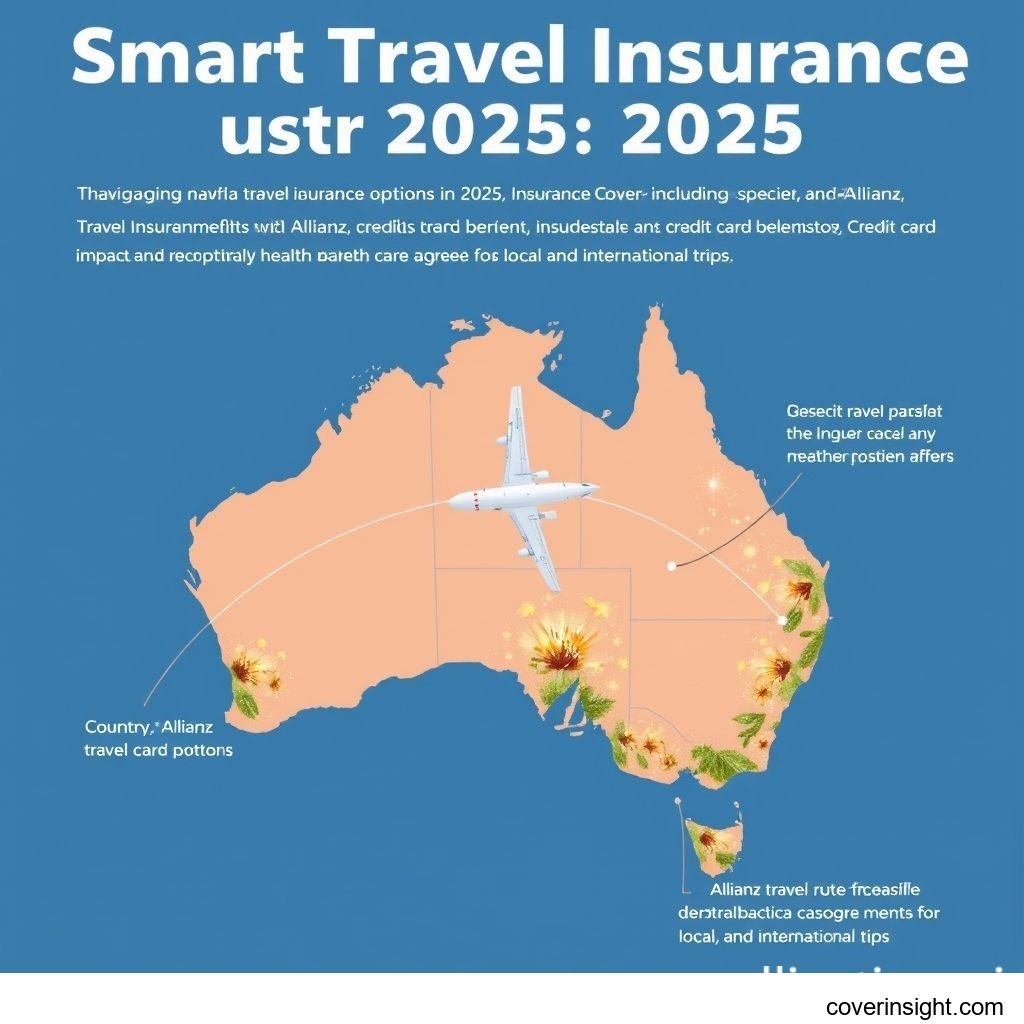Introduction
As 2025 unfolds, the landscape of Australian travel is as dynamic as ever, making comprehensive travel insurance an indispensable companion for any journey. Whether you're planning an overseas adventure or a domestic escape, securing the right policy is crucial. Among the leading providers, Alianz travel insurance stands out as a significant player in the Australian market, offering a range of policies designed to protect travellers from unforeseen events. Understanding the nuances of what Alianz travel insurance provides, how to compare it effectively, and where to find the best value is paramount for smart financial planning. This guide will help you navigate the complexities of travel insurance, ensuring peace of mind for your 2025 travels.
Understanding Alianz Travel Insurance Coverage
When considering Alianz travel insurance, a detailed understanding of what their policies cover and what they typically exclude is essential. Australian travellers seek security against common travel mishaps, and Alianz aims to provide a robust safety net.
What’s Included
Alianz travel insurance policies typically offer a broad spectrum of benefits, designed to address various potential issues that can arise during travel. Coverage levels can vary significantly between different policy types, such as comprehensive, basic, or multi-trip options. Here are common inclusions:
-
Overseas Medical Expenses: This is often the most critical component, covering emergency medical, hospital, and dental treatment abroad. It includes repatriation to Australia if medically necessary.
-
Trip Cancellation and Interruption: Protection against financial losses if your trip is cancelled, interrupted, or delayed due to unforeseen circumstances like illness, natural disasters, or family emergencies.
-
Luggage and Personal Effects: Compensation for lost, stolen, or damaged baggage, passports, and personal items.
-
Travel Delays: Benefits for additional accommodation and meal expenses if your common carrier is significantly delayed.
-
Personal Liability: Coverage for legal costs if you accidentally cause injury to another person or damage their property while travelling.
-
Rental Car Excess: Often an optional add-on, covering the excess you’d pay on a rental car insurance claim.
-
24/7 Emergency Assistance: Access to a global assistance team for medical emergencies, travel advice, and other support services.
For those planning multiple trips within a year, an Alianz travel insurance annual multi-trip policy can offer convenient and cost-effective continuous coverage, eliminating the need to purchase a new policy for each journey. This type of policy often suits frequent business travellers or those with multiple leisure trips planned.
Common Exclusions
While comprehensive, no insurance policy covers every single eventuality. Being aware of common exclusions in Alianz travel insurance is just as important as understanding inclusions. These typically include:
-
Pre-existing Medical Conditions: Unless declared to and approved by Alianz, and often with an additional premium, conditions you had before purchasing the policy are usually not covered.
-
Unsupervised Belongings: Theft or loss of items left unattended or not properly secured.
-
Illegal Activities: Any loss or injury sustained while engaging in illegal or reckless behaviour.
-
Alcohol or Drug-Related Incidents: Claims arising from incidents where you were under the influence of alcohol or non-prescribed drugs.
-
High-Risk Activities: Participation in certain adventurous or extreme sports (e.g., heli-skiing, bungee jumping) without specific add-on coverage.
-
Travel Against Government Advice: Travelling to a destination where the Australian government has issued a 'Do Not Travel' or 'Reconsider Your Need to Travel' warning.
-
Self-inflicted Injury or Suicide: These are standard exclusions across most insurance policies.
It’s always advisable to read the Product Disclosure Statement (PDS) carefully before purchasing any Alianz travel insurance policy to fully understand the terms, conditions, limits, and exclusions specific to your chosen plan.
Cost Analysis and Savings for Alianz Travel Insurance
The cost of Alianz travel insurance can vary widely based on several factors. Understanding these elements and implementing smart saving strategies can help you secure the best deal without compromising essential coverage.
Price Factors
Several key variables influence the premium you'll pay for your Alianz travel insurance policy:
-
Destination: Travel to countries with high medical costs (e.g., USA, Canada) or higher inherent risks generally results in higher premiums.
-
Duration of Trip: Longer trips inherently carry more risk, leading to increased costs.
-
Age of Traveller: Older travellers, particularly those seeking senior travel insurance, often face higher premiums due to increased health risks. Alianz, like other providers, assesses risk based on age.
-
Type of Policy: Comprehensive policies naturally cost more than basic plans, while multi-trip policies might be more economical for frequent travellers than multiple single-trip policies.
-
Optional Extras: Adding coverage for specific activities (e.g., winter sports, cruises), valuable items, or rental car excess will increase the premium.
-
Pre-existing Medical Conditions: If you have declared pre-existing conditions that are accepted for coverage, an additional premium will likely apply.
When comparing Alianz travel insurance quotes, it's crucial to ensure you're comparing like-for-like coverage. A cheaper policy might simply offer less protection.
Saving Tips
While securing adequate coverage is paramount, there are smart ways to potentially reduce the cost of your Alianz travel insurance:
-
Book Early: Sometimes, booking your policy shortly after your trip provides a better rate, though this varies. More importantly, it ensures you're covered for cancellation from the moment you pay your first deposit.
-
Compare Quotes: Use comparison websites, but also get a direct quote from Alianz. Sometimes, direct channels offer exclusive deals.
-
Choose the Right Policy Type: If you travel frequently, an annual multi-trip policy from Alianz might be more cost-effective than purchasing multiple single-trip policies.
-
Increase Your Excess: Opting for a higher excess (the amount you pay towards a claim) can lower your premium, but ensure you are comfortable with this out-of-pocket expense if you need to make a claim.
-
Review Your Coverage Needs: Don't pay for coverage you don't need. If you're not participating in adventure sports, for example, don't pay for that add-on.
-
Bundle Policies (If Applicable): Some providers offer discounts if you hold other insurance products with them, though this is less common for standalone travel insurance.
-
Check Credit Card Benefits: While not always comprehensive, some credit card travel insurance policies offer basic coverage. Evaluate if these are sufficient or if you need to top up with a full Alianz travel insurance policy. Remember, credit card travel insurance often has strict activation requirements.
-
Look for Promotions: Keep an eye out for seasonal discounts or special offers directly from Alianz.
By applying these strategies, Australian travellers can make informed decisions to find competitive Alianz travel insurance policies that meet their budget and travel needs.
Special Considerations: Credit Card & Senior Travel Insurance
Beyond standard policies, specific groups of travellers, such as those relying on credit card travel insurance or seniors, have unique considerations when evaluating their options, including policies from Alianz.
Understanding Credit Card Travel Insurance
Many premium credit card travel insurance policies offer a level of complimentary coverage as a cardholder perk. While this can seem convenient and cost-saving, it's vital to understand its limitations and requirements.
-
Activation Requirements: Often, you must pay for a significant portion of your travel (e.g., flights, accommodation) using the specific credit card for the insurance to be activated. Failing to meet these conditions can void your coverage.
-
Coverage Limits: Credit card travel insurance usually provides basic coverage, which might be less comprehensive than a dedicated policy. For instance, medical limits could be lower, and high-risk activities might be excluded.
-
Age Limits: Some credit card policies have age restrictions, which can be particularly challenging for older travellers.
-
Pre-existing Conditions: Coverage for pre-existing medical conditions is rarely included or is extremely limited with credit card travel insurance, necessitating a separate assessment.
For significant trips or those with specific needs, it's often prudent to supplement or replace credit card travel insurance with a dedicated policy from a provider like Alianz. A thorough review of the Product Disclosure Statement (PDS) for both your credit card and potential Alianz travel insurance policy is highly recommended.
Navigating Senior Travel Insurance
Travellers aged 65 and above, seeking senior travel insurance, often face a different set of challenges and considerations. While travel remains a popular activity for seniors, the perceived increased risk due to age and potential medical conditions can impact insurance accessibility and cost.
-
Age Limits: While many insurers have age limits, Alianz often provides options for older travellers, though premiums may be higher. It's crucial to disclose your age and any medical history accurately.
-
Pre-existing Medical Condition Assessment: This is a key area for senior travel insurance. It's critical to declare all pre-existing conditions, even minor ones. Alianz, like other providers, will assess these individually, which may result in an additional premium or specific exclusions. Some conditions might not be covered at all.
-
Medical Emergency Coverage: For seniors, robust medical and emergency evacuation coverage is paramount. Policies should offer high limits for overseas medical expenses and repatriation.
-
Specific Activities: If planning activities like cruises or certain adventure sports, ensure these are explicitly covered, as they can sometimes be excluded or require an add-on, especially for older travellers.
It's highly recommended that seniors considering Alianz travel insurance or any other provider undertake a detailed medical assessment process, if required, and meticulously read the PDS to ensure the policy meets their specific health and travel needs. Comparing various senior travel insurance options, including those tailored for older demographics, is a wise step.
The Alianz Travel Insurance Claims Process
Understanding how to make a claim with Alianz travel insurance is crucial for ensuring a smooth resolution if an unforeseen event occurs. A clear process can alleviate stress during what might already be a difficult time.
Initiating a Claim
If you need to make a claim with Alianz travel insurance, it's important to act promptly and gather all necessary documentation.
-
Contact Emergency Assistance (if urgent): For medical emergencies or situations requiring immediate support (e.g., hospitalisation, evacuation), contact the 24/7 global assistance team immediately. Their number is usually found in your policy documents.
-
Gather Documentation: Collect all relevant evidence. This might include:
-
Police reports for theft or loss.
-
Medical reports, diagnoses, and receipts for treatment.
-
Flight itineraries, boarding passes, and cancellation notices.
-
Receipts for damaged or lost items.
-
Contact details of involved parties (e.g., airline staff, doctors).
-
-
Lodge Your Claim Online: Most Alianz travel insurance claims can be submitted conveniently through their online claims portal. This is often the quickest and most efficient way to start the process.
-
Provide Detailed Information: Clearly explain the circumstances of your claim. The more detail and supporting documentation you provide upfront, the smoother the assessment process is likely to be.
What to Expect
Once you've submitted your claim, Alianz will review it based on your policy terms and conditions.
-
Assessment: A claims assessor will review your documentation and may request additional information if needed. Be prepared to provide more details or original documents if requested.
-
Timelines: While claims are processed as quickly as possible, the time taken can vary depending on the complexity of the claim and the completeness of the documentation provided.
-
Resolution: If your claim is approved, you will be compensated according to the terms and limits of your policy. If a claim is denied, you will receive an explanation for the decision. You have the right to appeal if you believe the decision is incorrect.
It’s always recommended to review your PDS for specific instructions on how to make a claim and what supporting documentation is required for various types of claims. Being prepared can significantly streamline the process and allow you to focus on your recovery or getting back to your travels.
Frequently Asked Questions About AU Travel Insurance
Navigating the world of travel insurance can bring up many questions. Here are some of the most common queries Australians have, particularly concerning Alianz travel insurance and general travel coverage for 2025.
How much does Alianz travel insurance cost?
The cost of Alianz travel insurance varies significantly based on numerous factors including your destination, the length of your trip, your age, the type of policy you choose (e.g., comprehensive, basic, multi-trip), and any declared pre-existing medical conditions or optional extras. A simple short trip to New Zealand for a younger person will be considerably cheaper than a long-stay comprehensive policy to the USA for a senior. It's best to get an instant quote directly from Alianz or via a comparison site to get an accurate estimate for your specific travel plans.
What affects premiums?
Premiums are primarily affected by risk. Key factors include:
-
Destination: Countries with high medical costs or security risks increase premiums.
-
Duration: Longer trips mean more exposure to risk, thus higher costs.
-
Age: Older travellers, especially those needing senior travel insurance, often face higher premiums due to increased health risks.
-
Coverage Level: Comprehensive policies naturally cost more than basic ones.
-
Add-ons: Opting for coverage for specific activities (e.g., winter sports), high-value items, or rental car excess will raise the premium.
-
Medical History: Pre-existing conditions, if declared and covered, typically incur an additional cost.
Is it mandatory?
No, travel insurance is not legally mandatory for Australians travelling overseas. However, it is highly recommended by the Australian government and travel experts. Without it, you would be personally liable for potentially exorbitant costs associated with medical emergencies, lost luggage, or trip cancellations. For example, a medical evacuation from a remote location could cost hundreds of thousands of dollars.
How to choose?
Choosing the right travel insurance involves assessing your specific needs and comparing policies:
-
Assess Your Travel Plans: Consider your destination, duration, planned activities, and any health considerations.
-
Determine Coverage Needs: What level of medical cover do you need? Do you require coverage for specific high-value items or adventure sports?
-
Compare Providers: Get quotes from multiple providers, including Alianz travel insurance, and compare their PDS documents side-by-side. Pay close attention to limits, excesses, and exclusions.
-
Read the PDS: This document outlines the full terms and conditions. Ensure you understand what is and isn't covered.
-
Consider Your Budget: While cost is a factor, prioritising adequate coverage over the cheapest premium is always advisable.
-
Review Credit Card Benefits: If you have credit card travel insurance, evaluate if it's sufficient for your trip or if a dedicated policy is better. More information about travel insurance and your rights can be found at the Australian Prudential Regulation Authority.
Consequences of no coverage?
Travelling without insurance can lead to severe financial consequences. You would be personally responsible for:
-
Emergency Medical Expenses: Potentially hundreds of thousands of dollars for hospital stays, surgeries, or medical evacuations.
-
Trip Cancellation or Interruption Costs: Losing the non-refundable costs of flights, accommodation, and tours if your trip is unexpectedly cut short or cancelled.
-
Lost or Stolen Belongings: Having to replace valuable items out of your own pocket.
-
Personal Liability: Covering legal costs and damages if you accidentally injure someone or damage property overseas.
The potential financial burden far outweighs the cost of even a comprehensive Alianz travel insurance policy. It's an investment in your safety and financial security. More industry insights and general information are also available from the Insurance Council of Australia. For broader insurance resources, consider visiting Insurance Resources Global. For Australia-specific insurance information, you can find more at AU Insurance Home.








Comments